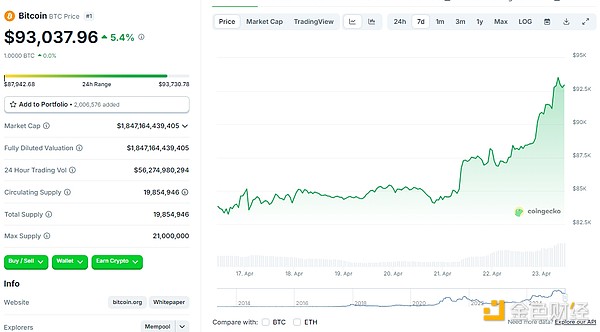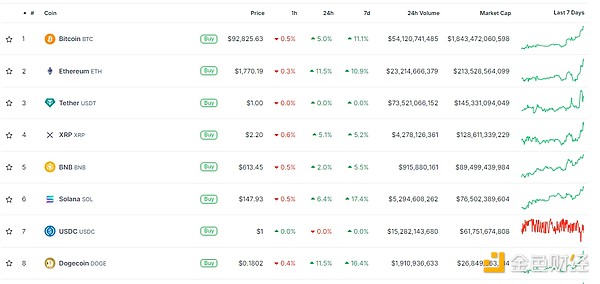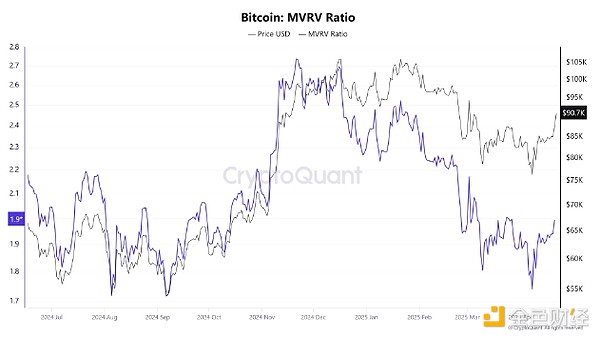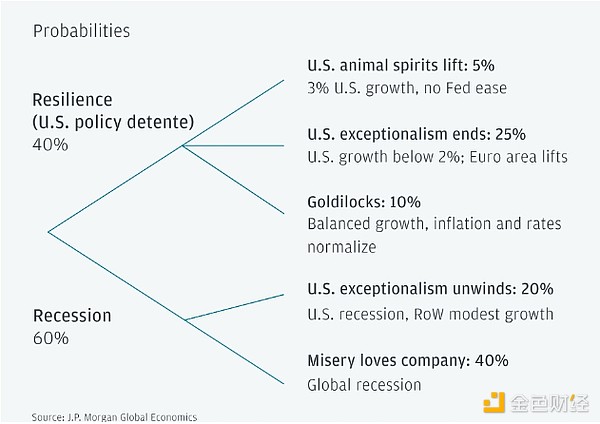Compiled by: Deng Tong, Golden Finance
The price of Bitcoin has been in a continuous downward trend since January, and the overall market of the crypto market has continued to be sluggish. But starting last night, BTC rebounded and rose, with the highest price exceeding $93,000, which may be a signal that Bitcoin may start a new long-term upward trend. As of press time, the price of BTC is now $93,037.96, with a daily high of $93,518.26. The entire crypto market is synchronized with the price of Bitcoin, and many cryptocurrencies have recorded double-digit gains. For a while, the sound of the bull market returning quickly was heard.
What caused the crypto market to rebound suddenly and sharply? How will the market trend go in the future?


1. Is Trump going to put down the tariff stick?
Early this morning, US President Trump said that tariffs on Chinese goods will not be as high as 145%. Tariffs will drop significantly, but they will not be zero. When Trump was asked whether he would take a tough stance on China, he said no.
In addition, Treasury Secretary Bessant hinted at a closed-door meeting at JPMorgan Chase that tariff policies will be relaxed. White House Press Secretary Levitt said at a press conference that Trump's relationship with China is moving in the right direction. For more details, please click 《Trump made three concessions at 00:00, 01:00 and 05:00 in the morning》
Charles Gasparino, a senior reporter at Fox Business Channel, said that today is a day of compromise in the market: Trump seems to have made concessions on trade policy and Powell's stay, and stock index futures rose accordingly; Musk also announced that he would gradually withdraw from the government efficiency department and return to Tesla's main business. The market is like this, it will always force you to bow your head and admit defeat. If you ask me: Make Caving Great Again! Maybe this time Trump and Musk will not change their minds and make accepting compromise a life creed!
Tesla CEO Musk said in a Tesla (TSLA.O) earnings call that he would continue to advocate for lower tariffs, but the decision on tariffs would be entirely up to U.S. President Trump. Musk said, I will provide my advice to the president, and the president will listen to my advice, but ultimately it is up to him to make the decision. I have publicly stated many times that I believe that lowering tariffs is generally good for prosperity, but the decision ultimately comes down to the president-elect who represents the people. Therefore, I will continue to advocate lower tariffs rather than raising them, but that's all I can do.
Adam Button, an analyst at the financial website Forexlive: The dollar continues to recover some of its losses yesterday. At the same time, the stock market strengthened and bonds saw some small buying. The market is eager to hear good news. I think the good news today is that Trump has remained silent on trade issues. This may convince some market participants that he is eager to reach a deal and anything that might turn the market around. Imagine the president remains silent on trade issues every day, (the market should be very happy).
It's not just the trade war with China. The White House is also close to reaching comprehensive agreements with Japan and India to avoid large-scale tariffs imposed by the United States, but they may leave many of the thorny details for later discussion. In the absence of a comprehensive trade agreement, government officials are working to sign a so-called "memorandum of understanding" or a broad "framework" for future agreements. One of the people familiar with the matter said, "It may take several months to finalize the final agreement. These things are complicated."
Second, crypto-friendly Paul Atkins officially took office as SEC Chairman
Paul Atkins was sworn in as Chairman of the U.S. Securities and Exchange Commission (SEC), and the formal handover of Gary Gensler's leadership is now complete. Atkins has worked with digital asset companies and is expected to continue the interim leadership's reversal of the U.S. SEC's previous resistance to cryptocurrencies. Atkins said he was honored by Trump and the U.S. Senate's "trust and confidence" in him and was happy to start work with other commissioners. He said in a statement: "We will work together to ensure that the United States is the best and safest place in the world to invest and do business."
Previously, he served as a member of the U.S. SEC and ran a Washington consulting firm focused on compliance and policy affairs. In addition to his Wall Street connections, Atkins also serves as a consultant to cryptocurrency companies.
Michael Saylor said: "SEC Chairman Paul Atkins will be positive about Bitcoin."
Trump said that SEC Chairman Paul S. Atkins is the best person to ensure certainty in cryptocurrency regulation.
Previously, Trump pointed out that the cryptocurrency industry is in urgent need of clear regulatory policies. Atkins' appointment is an important factor that is beneficial to the crypto market.
Third, financial markets are concerned about the independence of the Federal Reserve
Tensions between Trump and Federal Reserve Chairman Powell are growing. The two's differences are mainly focused on concerns about inflationary pressures brought about by tariffs and the Federal Reserve's reluctance to cut interest rates, casting a shadow on the US dollar.
The US dollar index, which tracks the exchange rate of the US dollar against a basket of currencies, has fallen since February, falling to its lowest point since 2022. Trump's public pressure on Powell and speculation that he may try to remove Powell or other Federal Reserve officials have heightened concerns about the independence of the Federal Reserve, which is a fundamental pillar of the US financial system.
The potential consequences of the depreciation of the US dollar on the global economy are difficult to predict, but one thing is certain: Bitcoin will be the main beneficiary. It is a decentralized, censorship-resistant currency that is completely managed by code, has a fixed supply schedule, and no central agency manipulates its issuance. As confidence in the traditional monetary system continues to erode, the narrative surrounding Bitcoin has become increasingly strong.
Jeff Kendrick, an analyst at Standard Chartered, said Bitcoin could rise to all-time highs if concerns about the independence of the Federal Reserve persist. He said cryptocurrencies are a hedge against risks to the existing financial system because of their decentralized ledgers. The risk to U.S. Treasuries was reflected after Trump hinted he might oust Fed Chairman Jerome Powell over his hopes for rate cuts. Kendrick said Bitcoin has benefited from a sharp rise in the yield premium investors are paying to buy long-term Treasuries over short-term ones.
Cryptocurrency analyst Rekt Capital pointed out that Bitcoin has decisively broken through the multi-month downtrend, "The multi-month downtrend is over. When the technical downtrend is broken, the technical uptrend will emerge."

BTC/USD 1-day chart. Source: Rekt Capital
Fourth, Countries and institutions increase their holdings of BTC
Bo Hines of the Presidential Digital Asset Advisory Committee said in an April 14 interview that the United States is looking for "a variety of creative ways" to fund its Bitcoin investment, including obtaining funds from tariff revenues and revaluing the Treasury's gold certificates to create a paper surplus to fund BTC reserves without selling gold.
On April 21, Saylor announced the acquisition of 6,556 bitcoins for approximately $555.8 million, with an average price of approximately $84,785 per coin. This brings MicroStrategy’s total holdings to a staggering 538,200 bitcoins, worth about $48.4 billion at current prices. DeFi Development Corporation (formerly Janover Inc.), a U.S.-listed company, announced it has increased its holdings of 88,164 Solana (SOL) worth about $11.5 million. The purchase brings the company’s total Solana holdings to 251,842, worth about $34.4 million (including staking rewards). Janover, an artificial intelligence platform that connects the commercial real estate industry, announced today that it has changed its name to DeFi Development Corporation.
Metaplanet CEO Simon Gerovich posted on the X platform that some shareholders have expressed concerns about the company's stock price, and will take this matter seriously and express gratitude. Metaplanet has increased its holdings to 4,855 BTC in the past year, with a Bitcoin return of 119.3% so far this year, becoming the largest Bitcoin listed company in Asia and the tenth largest holding company in the world. It still insists on reaching the goal of 10,000 BTC by the end of this year. Although the stock price fluctuates in the short term, it is believed that the stock price will tend to fundamentals in the medium and long term.
Tesla has not conducted any cryptocurrency transactions in the past three months and currently holds 11,509 Bitcoins on its balance sheet.
At the same time, investors who prefer traditional financial instruments rather than directly holding Bitcoin have also begun to rekindle their interest. According to CoinGlass, on April 21, BTC ETFs recorded $381 million in inflows — a much-needed reversal after a prolonged period of massive outflows. Since February, ETFs have experienced 33 days of net outflows, compared to just 21 days of inflows, with outflows dominating volume. The recent reversal suggests renewed investor confidence, especially from the TradFi camp.

Spot Bitcoin ETF Fund Flows. Source: SoSoValue
5. Russia-Ukraine War May Be Calmed
US President Trump said on the 21st local time that he would announce a peace plan for the Russia-Ukraine conflict in the next three days.According to reports from multiple US media, the plan may include territorial issues and sending European troops into Ukraine. Previously, Trump also issued a statement calling on Russia to end the Russia-Ukraine conflict: Russia must act. Too many people are dying, thousands of people a week, in a terrible and meaningless war. If I were president, this war should not have happened and would not have happened!
Six. Bitcoin's market share rises to a nearly four-year high
According to TradingView data, Today, Bitcoin's market share (BTC.D) has risen to 64.61%, a new high since February 2021. The high market share of Bitcoin shows the silence of the altcoin market, but it also represents the bottoming out and rebound is coming. According to previous historical data, when Bitcoin's market share reached 60% in November last year, altcoins started a small bull market. In 2019 and 2021, Bitcoin's market share reached a high of 70%, followed by a magnificent general rise.
Seven. How will BTC rise in the future?
In the long term, DYOR Crypto founder Hitesh Malviya said that if BTC maintains an MVRV ratio of 2 over the next six weeks, its gains could reach 70% to 80%. The market value to realized value (MVRV) ratio is a key on-chain metric that compares Bitcoin's market capitalization to its realized value, or what Bitcoin is worth at its most recent trading price. Historically, MVRVs above 3.7 have typically signaled overvaluations and market tops, while MVRVs close to 2 have signaled strong price increases.

Bitcoin MVRV ratio. Source: CryptoQuant
Bitcoin’s MVRV score remained above 2 from October 2024 to February 2025, consistent with its all-time high. Recently, the indicator fell below 2 during the market correction, but is currently attempting to recapture this key level.
Institutional demand for bitcoin from exchange-traded funds (ETFs) and traders seeking to hedge macroeconomic risk could cause bitcoin prices to more than double this year, analysts at Standard Chartered and Intellectia AI said. Intellectia AI also believes that institutional demand drivers, including corporate bitcoin buyers as well as exchanges, are likely to continue to drive positive price action.
But analytics firm CryptoQuant also warned that headwinds to bitcoin's gains, driven by renewed investor optimism and new hopes for easing trade tensions between China and the United States, remain and could limit further gains. If sentiment weakens, the market could see a pullback.
VIII. Appendix: Can tariffs really benefit the U.S. economy?
Goldman Sachs economists predict that U.S. GDP in the fourth quarter will grow by only 0.5% from the fourth quarter of 2024 as tariffs and policy uncertainty weigh on the economy. Currently, business and consumer surveys point to a slowdown, but official economic data have yet to show that sign. They infer that economic indicators may begin to show a recession more clearly in mid-to-late summer. "The evolution of the data in recent weeks is consistent with previous 'event-driven' growth slowdowns. However, it is too early to draw strong conclusions from the limited data available." Citigroup chief economist Stephen Sheets said on Tuesday that there is a 40% to 45% chance of a U.S. recession due to the impact of tariffs imposed by U.S. President Trump on other trading partners. Sheets expects U.S. GDP to grow in the second quarter, mainly driven by consumers rushing to buy goods before tariffs take effect. He said the biggest impact on U.S. economic growth is expected to be felt in the second half of this year. "Tariffs are a stagflationary shock to the U.S. economy," Sheets said.
JPMorgan Chase said in a research report on April 15 that the probability of a U.S. recession in 2025 has risen from 40% to 60%. The report wrote: "The latest removal of the Liberation Day tariffs has reduced the shock to the global trading order, but the remaining 10% general tariffs still pose a substantial threat to economic growth, while the 145% tariffs on China keep the probability of a recession at 60%."

Global Recession Outlook. Source: JPMorgan Chase
Jeffrey Sachs, professor of economics at Columbia University, said in an interview recently that over time,the U.S. share in the world economy is declining, and the U.S. dollar will no longer be the world's main currency, and this cannot be stopped.The weaponization of the U.S. dollar forces other countries to abandon dollar settlement. Sachs said that the United States has weaponized the U.S. dollar and often uses the dollar's dominant position to threaten other countries and interfere with trade, which will force other countries to gradually abandon the use of the U.S. dollar for settlement in international trade and switch to other currencies. Sachs also predicted that in 10 years, the role played by the U.S. dollar will be completely incomparable to what it is now.
 Jasper
Jasper
 Jasper
Jasper Hui Xin
Hui Xin Jasper
Jasper Jasper
Jasper Jasper
Jasper Jasper
Jasper Hui Xin
Hui Xin Hui Xin
Hui Xin Joy
Joy Jixu
Jixu